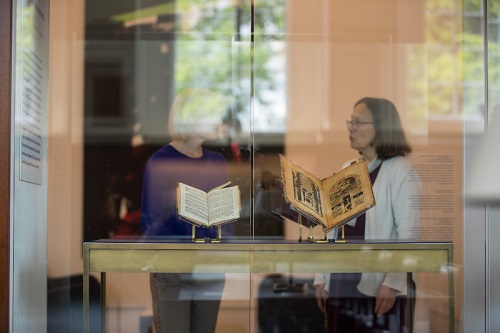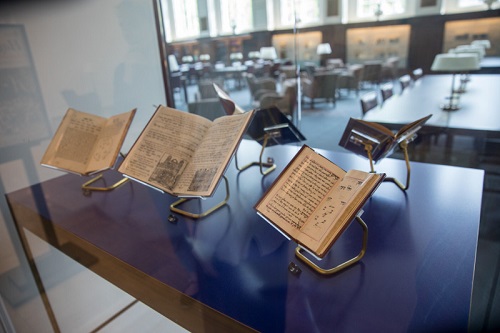PROVIDENCE, R.I. [Brown University] —The Brown University Library is now home to a collection of rare illustrated texts that depict how Jewish communities have celebrated the Passover Seder across the globe, spanning more than 400 years and in a wide range of languages.
The Dr. Steven Ungerleider Collection of Haggadot — given to Brown by Ungerleider in honor of his father, Brown Class of 1939 graduate Samuel Ungerleider Jr. — includes Haggadot, the plural form of Haggadah. Each Haggadah functions as a guide that sets forth the order of rituals, blessings and customs of the first two nights of the Passover Seder, which commemorates the Israelites’ exodus from Egypt.
“This culturally and historically significant collection will provide scholars and the public with rare insights into the lived experience and shared customs of Jewish communities all over the world,” said Brown University President Christina Paxson. “Steven Ungerleider’s generous gift enables the University Library to preserve this unique resource, which supports a wide range of research and learning.”
Haggadot in the Ungerleider collection hail from Jewish communities in Asia, Africa, Europe, North America and the Near East. Included are Haggadot used in Constantinople in 1505, in Calcutta in 1841 and by Holocaust survivors in displaced persons camps around Munich in 1945 to 46, among many others.

“It would be hard to overstate the importance of the collection for anyone interested in the history of Jewish culture, the Jewish religion and the Jewish people,” said Adam Teller, professor of Judaic studies and history at Brown.
Because the Haggadot were used by families and groups as a guide during Passover, the texts include handwritten annotations, inscriptions and insertions. The geographical breadth of the collection means that these notations are written in languages ranging from Yiddish and Ladino to Judeo-Italian and Judeo-Arabic.
“The geographic range it covers stretches from the U.S. to Australia via India, and from Casablanca to Moscow via Jerusalem,” Teller said. “In terms of faculty making use of these volumes in their research and teaching, I can think of colleagues in Judaic studies, religious studies, history, the history of art and architecture, the Department of Music, Italian studies, Renaissance and early modern studies, German studies, and even Slavic studies, who might benefit from them.”
All of the Haggadot in the Ungerleider collection may be viewed in their original print format in the Special Collections Reading Room at Brown’s John Hay Library, which is open to the public. Many of the texts are available in digital form, and the Library plans to digitize more material from the collection.

The Corporation of Brown University formally accepted the gift of the Ungerleider Collection, valued at more than $2 million, at its May 2018 meeting.
“The Ungerleider Collection is a gift from the heart, representing Steven Ungerleider’s love for his family and religion, as well as his love of learning and sharing knowledge,” said Harriette Hemmasi, the Brown University Librarian. “The Library is honored to accept this exceptional treasure and to make these invaluable materials available to scholars at Brown and around the world.”
Steven Ungerleider is an author, psychologist and Olympic sports medicine specialist who has researched and written about doping and prevention, with a particular focus on the practices of the former German Democratic Republic. He served as the Olympic cultural liaison to the German and Israeli governments for the building of the Munich Memorial honoring the 11 athletes murdered at the 1972 Olympic Games, and consulted on an award-winning documentary film about that incident.
Ungerleider recalled that his father, who graduated from Brown in 1939 and died at age 55 in 1972, “loved Brown and wore its colors with pride. He took us to lots of events in Providence to experience the Brown University culture.” Ungerleider described his father as a cultural Jew who loved Israel and the Passover Seder, over which he would preside, making use of the family’s Haggadah.
Ungerleider’s mother, Joy Ungerleider-Mayerson, received an honorary degree from Brown in 1994, and the family has also supported scholarship and teaching at Brown through the Dorot Professorship in Judaic Studies.
The collection was the subject of the exhibition “Haggadah: Telling and Retelling the Story of Jewish Liberation,” on view at the John Hay Library through June 15.